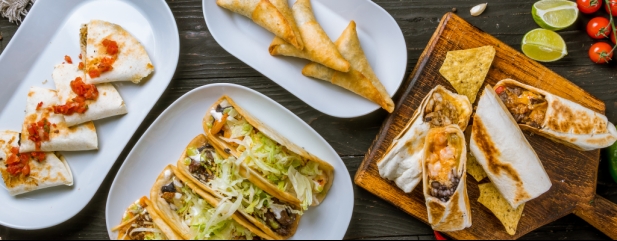Archived article
Please note that tax, investment, pension and ISA rules can change and the information and any views contained in this article may now be inaccurate.
The fast-food stocks making investors rich: the secrets of their success

Despite gloomy commentary on the state of the economy caused by rising interest rates and a cost-of-living crisis, one corner of the stock market appears to be in rude health.
Big players in fast food or quick service restaurants look to be at the top of their game with many shares in this space trading at new all-time highs.
For example, McDonald’s (MCD:NYSE) is up 27% over the past 12 months, while Yum! Brands (YUM:NASDAQ), owner of KFC and Taco Bell, is up 25% and Burger King’s parent Restaurant Brands International (QSR:NYSE) is up 44%.
Easily the biggest winner over the past 12 months is chicken wing-focused Wingstop (WING:NASDAQ) whose share price is up 180%.
WINGSTOP’S RECIPE FOR SUCCESS
The idea for the Buffalo-style chicken wing operator was hatched in 1994 and the firm now operates from over 1,500 stores across the US, South America, Asia, France and the UK.
Its shares listed on the Nasdaq exchange in the US in 2015 and have delivered a six-fold share price return to investors, equivalent to a compound annual growth rate of around 27% a year.
However, before rushing out to buy the shares, it should be pointed out they don’t come cheap and trade on a one-year forward price to earnings ratio of 90.8. That compares with 17.6-times for the S&P 500 index.
The high rating reflects a fast-growing business which has delivered earnings per share growth of 24% a year over the last decade. Earnings are expected to grow at a more modest clip of around 15% a year over the next couple of years, according to Refinitiv data.
Prospects of maintaining high growth may seem like a tall order but the company has plenty of room to grown if it wants to catch up with McDonald’s which has a footprint of 40,000 stores across 100 countries.
Mexican-themed Chipotle Mexican Grill (CMG:NYSE) is another fast-growing business. It operates from around 3,200 restaurants, making it double the size of Wingstop in terms of outlets.
The business is expected to generate revenue of $9.9 billion and a net profit of $1.2 billion in 2023, according to Refinitiv data. Analysts expect earnings per share to increase 35% in 2023 and 21% in 2024. Over the last five years earnings have grown at a rapid clip of 38% per year. The shares trade on a one year forward PE of 42, less than half the rating of Wingstop.
STAR PERFORMERS
The table shows the total returns (share price gains/losses and dividends) from popular fast-food companies around the world. Note that you can buy shares in most of the best-known chains either on the US or UK stock market. One notable exception is Subway which is privately-owned.
Chipotle Mexican Grill is the best performer over the past five years, generating a 364% total return. Close behind is Wingstop with a 355% total return. In third place is Greggs (GRG) with a 197% return. The laggards are Shake Shack (SHAK:NYSE) which has nearly 460 locations – approximately two thirds in the US and Colombia and the rest overseas – and Jack in the Box (JACK:NASDAQ) which has more than 2,000 sites mainly on the West Coast of the US. Both have generated a 15% total return over five years.
WHAT ARE THE WINNERS’ KEY QUALITIES?
The strong returns achieved for most of the selected shares may at first appear counter-intuitive to a generally held view that the fast-food sector is highly competitive with few barriers to entry and limited brand loyalty.
The best positioned fast-food operators have managed to build strong brand value which has allowed them to flourish over decades.
McDonald’s is a good example. According to Statista, McDonald’s brand value was $196.5 billion in 2022, making it one of the top 10 most valuable global brands.
Brand value isn’t visible in a firm’s report and accounts. It represents intangible value. Tangible assets like plant and machinery can be touched and measured unlike intangibles.
Fundsmith founder Terry Smith is a big fan of intangible value and says: ‘We seek to invest in businesses whose assets are intangible and difficult to replicate.’
Another advantage of intangible assets according to Smith is that it is hard for competitors to replicate intangible assets with borrowed funds because banks tend to favour the comfort of tangible collateral. Importantly, concludes Smith, this means the business does not suffer from ‘economically irrational’ competitors.
Size can create further barriers which serve to protect the business. McDonald’s spends around $400 million a year on advertising which is difficult for smaller competitors to match.
A further distinguishing feature of several companies in the table is that they operate franchised businesses which have the advantage of being able to expand quickly in a capital-light way.
You know you’ve made it into the big leagues when The Economist creates an index from your product as an informal way of measuring consumer purchasing power in different countries.
The Big Mac index started in 1986 and can be used to estimate the theoretical value of currencies. For example, a Big Mac in the UK costs £3.79 while in the US it is $5.36, according to The Economist.
This implies an exchange rate of £1.41 to the US dollar. Given the current exchange rate is £1.25, it means the pound is 11% undervalued, based on the Big Mac index.
McDonald’s has been no slouch in returns either, delivering roughly 13% a year over the last 40 years, giving investors a 115-fold return.
On top of that, the company has a long history of increasing its dividend which stretches back to 1976. Over the past decade the dividend has increased by around 7% a year. In addition, the company has purchased and cancelled around 25% of its shares in the past decade.
WHY ARE FAST-FOOD COMPANIES DOING SO WELL?
The big players can offer great value for money which is a key advantage when times are tough. In addition, they have been able to pass on higher costs through menu increases without losing customers.
Chipotle Mexican Grill has increased menu prices by a tenth from a year ago, helping it top first quarter sales and earnings estimates as same-store sales grew 10.9%. Traffic rose 4% as both lower and higher income diners visited more frequently.
Higher menu prices and lower avocado costs pushed up margins as net income jumped 81% to $291.6 million. CEO Brian Niccol said the chain has demonstrated pricing power, adding: ‘We don’t want to be in front of the inflationary environment, but we also don’t want to fall behind.’
Constant innovation is another differentiating factor working in favour of the best operators. Chipotle generates nearly 40% of its total sales from digital orders. It works hard to improve speed of service and accuracy to efficiently manage demand from in-person diners and digital orders. The company plans to open 255 to 285 new restaurants in 2023.
Burger chain Wendy’s (WEN:NASDAQ) reported an upbeat first quarter ahead of analysts’ estimates after delivering 8% growth in same restaurant sales. The company reiterated 2023 global system-wide sales growth of between 6% and 8%, with earnings per share expected to grow between 14% and 20%. Digital sales accelerated to represent 12% of overall sales while management committed to delivering ‘meaningful’ global growth.
Higher margins led to a big jump in free cash flow to $40.7 million which allowed the company to continue buying back shares and double the quarterly dividend to $0.25 per share.
The company is planning to launch an artificial intelligence chatbot to automate its restaurants’ drive-throughs. Called FreshAI, the bot will hold limited conversations with customers and answer frequently asked questions.
‘Wendy’s introduced the first modern pick-up window more than 50 years ago and we’re thrilled to work with Google Cloud to bring a new wave of innovation,’ said CEO Todd Penegor.
Starbucks (SBUX:NASDAQ) also recently beat quarterly earnings estimates as same store sales jumped 12% boosted by a 6% increase in traffic. The company’s second largest market, China, registered its first same-store sales growth since the third quarter of 2021 as the country emerges from its prior zero-Covid policy.
Belinda Wong, the boss of Starbuck’s Chinese mainland operations, said her part of the business registered 30% same-store sales growth in March which continued into the firm’s third quarter.
SHARES’ TOP PICK
YUM! BRANDS
BUY AT $137.22
Yum! Brands (YUM:NASDAQ) owns iconic restaurant brands KFC, Pizza Hut and Taco Bell as well as The Habit Burger Grill. Its subsidiaries franchise or operate more than 55,000 restaurants spanning 155 countries.
We like the firm’s exposure to a reopening Chinese market which is its second largest behind the US. We also favour its high proportion of digital sales which make up 45% of total sales and strong brands which focus on value for money meals.
Deals such as Taco Bell’s ‘$2 and under’ menu, KFC’s ‘two for $5’ and Pizza Hut’s $6.99 ‘melts’ have attracted diners in their droves and helped to drive 6% growth in same-store sales across the group in 2022.
China is KFC’s largest market. In the first quarter of 2023 the company said system sales in that country jumped 17%. China is the second largest market for Pizza Hut and system sales went up by 24% in the quarter. The brand also performed well in the US with same-store sales up 8%.
Meanwhile, Mexican-themed Taco Bell reported first quarter same-store sales growth of 8%. Taco Bell is Yum! Brands’ fastest growing international brand with 746 new locations opened in the first three months of 2023.
As well as providing double digit annualised gains in the share price, Yum! Brands has delivered 20% annualised growth in dividends per share over the last two decades.
Analysts forecast 15% to 16% earnings growth over the next two years which is up with the fastest growing fast-food businesses while the PE ratio of 26.7 times is towards the bottom end of the pack.
Important information:
These articles are provided by Shares magazine which is published by AJ Bell Media, a part of AJ Bell. Shares is not written by AJ Bell.
Shares is provided for your general information and use and is not a personal recommendation to invest. It is not intended to be relied upon by you in making or not making any investment decisions. The investments referred to in these articles will not be suitable for all investors. If in doubt please seek appropriate independent financial advice.
Investors acting on the information in these articles do so at their own risk and AJ Bell Media and its staff do not accept liability for losses suffered by investors as a result of their investment decisions.
Issue contents
Danni Hewson
Feature
- Artificial intelligence: the stocks using it to their advantage
- Discover how these two technical indicators can make you money and two shares to buy now
- Emerging markets: earnings season, resource nationalism and a tale of two sectors
- Are emerging markets less reliant on commodities than you think?
- The fast-food stocks making investors rich: the secrets of their success
- Should I worry if my investments aren’t making money?
Great Ideas
News
- Initial surge as Zoom beats expectations and lifts forecasts fails to last
- ATOME shares boosted by Baker Hughes investment and its fertiliser plan
- Germany’s flagship DAX index surges to new all-time high
- The owner of Boots loses a quarter of its value in six months
- Sage seizes its chance to impress investors
- Stealth rally in construction stocks suggests economy is on a firm footing

 magazine
magazine








